Recipients of the Matt Wilson Scholarship 2024/2025

Klebsiella pneumoniae is a major human pathogen of growing global health concern. Among its different pathotypes, the hypervirulent strains are particularly dangerous, causing severe and often fatal infections even in healthy individuals. A defining feature of these strains is their thick capsule, which protects them from the immune system but also affects how they interact with host cells. Understanding how capsule production is regulated is therefore crucial for the development of new treatments and preventive strategies.
My research focused on the rmpA gene, a key regulator of capsule production in Klebsiella. Our lab has shown that rmpA undergoes phase variation, a process in which the gene switches ON and OFF through reversible mutations mediated by a poly-G repeat tract. My work specifically investigated how this switching mechanism enables the bacteria to adapt during infection, shaping its ability to adhere to, invade, and survive within epithelial cells.
Thanks to the Matt Wilson Scholarship, I was able to expand my research in significant ways. With its support, I applied hybrid Illumina/Oxford Nanopore sequencing technology to analyse over 20 post infection isolates for mutations in the rmpA gene. I also received training in a high-throughput technique, PCR-based fragment size analysis using Thermo Fisher’s PS Analyzer software, which introduced me to advanced computational biology approaches and enabled precise analysis of simple sequence repeat mutations compared to manual methods. In addition, I incorporated ELISA assays to study antibody binding and its relationship to capsule specificity, adding an important immunological perspective to my research. I am deeply grateful for this scholarship, which has not only broadened the scope and impact of my project but has also strengthened my computational and experimental expertise, making it instrumental in my scientific growth.
Aarabhi Ravikrishnan Nair
Biomedical and Molecular Sciences Research, MSc

In my six-month project, we aimed to identify a more representative biomarker for early chronic kidney disease, which we believed to be the urinary ratio of the full-length CTGF to the C-tail fragment of CTGF. We hypothesised that a specific protease was modulating this ratio. To investigate this, we were given the opportunity, through funding from the Matt Wilson Scholarship, to use mass spectrometry and further explore whether the protease in question was MMP-9.
I am eternally grateful to Matt Wilson’s family for providing this scholarship and will always be proud to have been a recipient. Beyond the financial support, it provided me with the confidence and encouragement to pursue my project with greater determination, and it remains a source of inspiration as I pursue my research journey.
Amir Hassan
Biomedical and Molecular Sciences Research, MSc
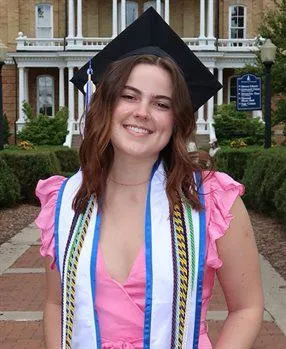
My research project focused on direct lineage reprogramming proliferative glial cells into functional neurons. Since the adult cerebral cortex exhibits limited neuroregenerative capacity, brain injury results in lasting cognitive defects as neurons fail to replenish themselves. Direct lineage reprogramming could be used to combat neuronal degradation and loss.
Ascl1 is well established as a glia-to-neuron reprogramming factor, with its phosphodeficient mutant (Ascl1SA6) achieving even more efficient reprogramming both in vivo and in vitro. The mechanism of Ascl1SA6 reprogramming remains poorly understood. Thus, my project aimed to characterize the relationship between Ascl1/Ascl1SA6 and Sox2 during reprogramming. The Matt Wilson Scholarship funded DNA methylation sequencing, which will paint a clearer picture of the effects of Sox2 knockdown on reprogramming. This opportunity will not only provide me with interesting data on the potential collaboration between Ascl1 and Sox2 but will also provide me with valuable experience in analyzing DNA methylation sequencing. Therefore, I want to highlight my gratitude to the Wilson family for providing me with this support for my MRes project.
Avery Buchanan
Biomedical and Molecular Sciences Research, MRes
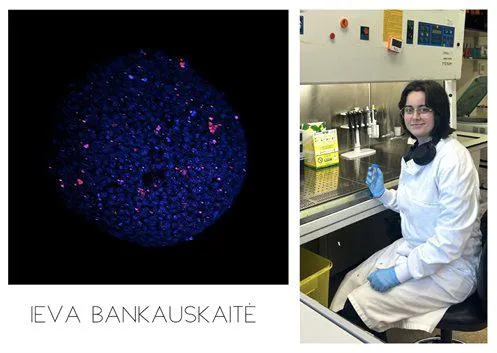
For my Msci Biochemistry research project I worked closely with Shangaris and Jacków groups to develop and optimise a 3D in vitro placental cell spheroid model to help study physical immune cell interactions in pregnancy. In normal pregnancy, the interactions between maternal immune cells and fetal placental cells trigger an immunological response that switches from pro-inflammatory state to tolerogeneic anti-inflammatory state. This switch plays a key role in successful implantation and when poorly regulated has been shown to lead to complications such as preeclampsia or miscarriage. Unfortunately, existing murine ex vivo or human 2D in vitro culture models are limited in use due to differences in phenotype and function to human in vivo interactions, hence there is rise in demand for in vitro 3D models, such as the one developed in this project, to help study these direct interactions in greater depth.
The Matt Wilson Scholarship helped me to significantly advance my professional development and learning. It helped fund the fluorescent antibodies necessary for me to learn, plan, and carry our advanced fluorescent cytometry techniques that helped identify different immune cell subpopulations in my samples. Furthermore, this scholarship has provided me an opportunity to participate in World Organoid & Organ-on-a-chip 2025 conference and training days in Cambridge. In this conference I got to meet and network with bright individuals in the 3D culture modelling field as well as learn from their experiences and their insightful tips and tricks, which I have applied later on in my own research.
Ieva Bankauskaite
MSci Biochemistry
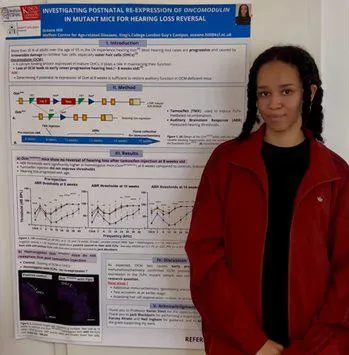
The Matt Wilson Scholarship allowed me to enhance my research project on progressive hearing loss linked to a deficit of the oncomodulin protein in mice. My research goal was to evaluate whether the activation of the Ocm gene using an inducible system could restore oncomodulin protein expression and prevent progressive hearing loss in these mice. Several time windows were tested, and auditory function was monitored using auditory brainstem responses, followed by histological analysis of the cochlea.
Thanks to the Matt Wilson Scholarship, I was able to fund the training course and fees for my Personal License for using animals in research, which is a legal requirement to conduct animal experiments. Without this licence, I could only have watched other people carry out these recordings. This Scholarship allowed me to work independently and provided me with essential training in animal work and experimental design, strengthening my practical skills and confidence. Part of the funding also contributed to the production of two additional age cohorts of mice, allowing me to extend and follow up my findings at the first age tested by recording from mice that had gene expression activated at two younger ages. Furthermore, the additional funding provided me with an opportunity to label cochlear samples with an antibody to oncomodulin at the end of the physiological recordings and then spend time on the confocal microscope to image and analyse the impact of restoring Ocm expression on sensory hair cell survival.
The opportunity provided by the Matt Wilson Scholarship therefore allowed me not only to meet the technical requirements of the project, but also strengthen my scientific and personal development by acquiring valuable experience in experimental research.
Océane Hill
Biomedical and Molecular Sciences Research, MSc
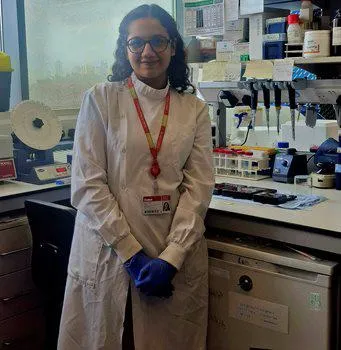
Cardiovascular disease is the leading cause of death worldwide, and congenital heart defects are the most common birth malformations. Despite advances in research, the biological processes underlying these conditions remain poorly understood, limiting the development of effective therapies and preventive strategies. A deeper understanding of heart formation is therefore crucial for improving both treatment and prevention of heart disease.
My research project aimed to investigate the role of the Slit-Robo pathway, previously known for its function in neuronal guidance, in epicardial epithelial-to-mesenchymal transition (EMT) during cardiac development. To address this, we conditionally knocked out Slit-Robo genes in the epicardium and employed a range of analytical methods to examine their effects on heart morphology and developmental dynamics.
The Matt Wilson Scholarship played a pivotal role in advancing this work. It allowed us to perform high-resolution episcopic microscopy (HREM) at Professor Duncan Sparrow’s lab at Oxford University, which was instrumental in decoding the morphological changes in the heart following gene deletion and correlating these findings with cellular and molecular data. Visiting the University of Oxford and learning this technique, along with advanced analysis methods such as using AMIRA software from the experts there, greatly enhanced my technical skills and expanded my research network. I am deeply grateful for the opportunities this scholarship provided.
Shreeya Bhaskar Kulkarni
Biomedical and Molecular Sciences Research MSc
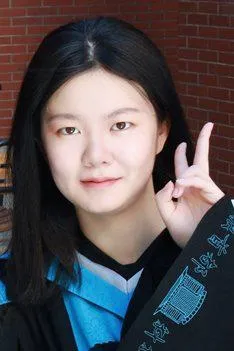
My project focused on developing heparan sulfate-mimetic polymersomes as a novel nanomedicine strategy for antiviral intervention. While designed with a broad-spectrum inhibition perspective, we have currently demonstrated their ability to block the entry of SARS-CoV-2 pseudovirus. These vesicles were designed to mimic the negatively charged surface of host cell heparan sulfate proteoglycans, thereby competitively preventing viral attachment and internalization.
Thanks to the Matt Wilson Scholarship, I was able to access cryo-transmission electron microscopy (cryo-TEM), which provided direct structural visualization of the polymersomes. This technique enabled confirmation of vesicle formation in the modified polymersomes, assessment of bilayer thickness, and a clear distinction of their vesicular structures from micelles with a level of detail that sulforhodamine B (SRB) dye encapsulation assays alone could not provide.
The scholarship facilitated our collaboration with electron microscopy specialists at King’s, giving me access to high-quality cryo-TEM data. These results significantly deepened my understanding of polymersome nanostructures, allowing me to relate key parameters, such as membrane thickness and particle size, to their antiviral performance. I am deeply grateful for the scholarship support, which not only made these experiments possible but also enriched my scientific perspective, strengthened my knowledge, and boosted my confidence as I move forward with future research studies.
Xinyue Zhu
Biomedical and Molecular Sciences Research, MSc